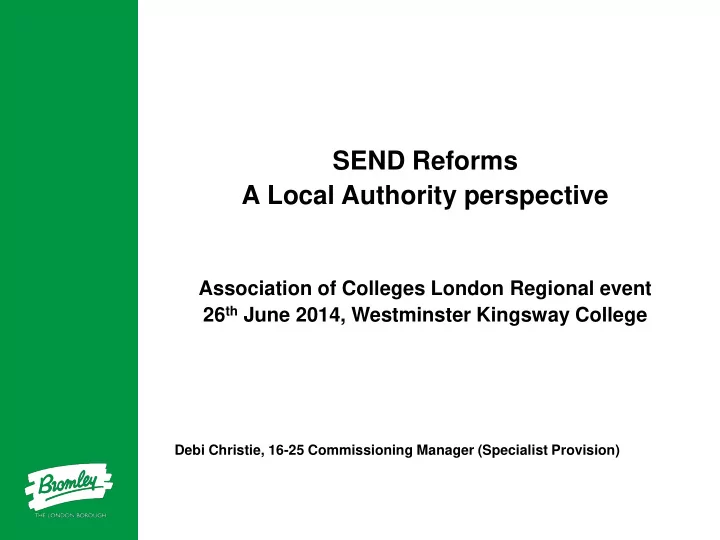

SEND Reforms A Local Authority perspective Association of Colleges London Regional event 26 th June 2014, Westminster Kingsway College Debi Christie, 16-25 Commissioning Manager (Specialist Provision)
Bromley in context • 20 11-18yrs schools (all but one Academy status) • 4 special schools, 3 with post-16 provision • 1 GFE college • 1 Independent Specialist College • High statementing borough – high levels of delegated funding • High number of placements at independent specialist providers (ISP) • 14-19yrs cohort with Statement of SEN – 773 (3.53% of 14-19yrs population) • 2013/14 FE cohort with high needs – 93 (48% in 7 FE mainstream colleges and 52% in in 14 ISPs, both day and residential) • Increase in the general population by 20% over the last 7 years & proportion of young people with SEND also increasing • Additional 280 pupils with SEND in the next 10 years – increase in complexity of need • SEND Pathfinder awarded Sept’11 - Preparing for Adulthood pathfinder borough
Areas progressing well • Shared vision & formal policy • Partnership working Young people and families Education, social care & health, including SEN, Looked After Children, Leaving Care, Mental Health, Youth Offending, Councillors Schools, colleges (mainstream, specialist, adult), voluntary sector • Preparing for Adulthood team • Nash College – destination led approach, highly commended by Ofsted • New facilities at Bromley College • A better understanding of the whole pathway - impact of decisions • Testing of locally developed Education, Health & Care Plans • Ability to influence national policy • Learning from other boroughs through pathfinder work
Areas for further development • An offer which enables the shared vision to be realised Mixed educational packages across specialist and mainstream Meaningful day opportunities for young people with direct payments Better use of short breaks locally Housing options Link courses to minimise placement breakdown Curriculum gap for young people more cognitively able with complex physical difficulties • Use of personal budgets • Understanding the links between the Care Act and the Children & Families Act • 0-25yrs internal processes, system and structures • Meaningful parental engagement and confidence • Outcomes within the EHC Plan Local authority – medium term outcomes (phase of education) Education providers – short term outcomes
Key learning points • Effective partnership working takes time and effort • The local offer is complex – education is just one part of the jigsaw • Long term outcomes (for many) is a new way of thinking - provision is not an outcome • The local authority’s role is to meet unmet needs – responsibility is wider than statutory services • Good commissioning in FE: High quality placement that meets an individual’s assessed needs Provides a strong foundation enabling learning in context through living and working following formal education Ensures a balance between value for money and outcomes to maximise progression and independence • Encourage grit and resilience within young people and families, enabling ‘controlled risks’ to be part of their lives • Managing the ‘fight’ out of the system – SEN can be a litigious environment • Political dimension? – Good services attract more people into the borough
Suggestions for effective partnership working • A shared vision and a common language • A good understanding of the statutory duties • Jointly developed assessment and review paperwork – EHC Plans reviewed annually • Be mindful of each parties constraints & individual planning cycles • A strong local partnership that includes young people, families, the local authority, schools, voluntary sector, colleges • Finding shared solutions • Knowing the key contacts – from commissioning and curriculum planning to data and finance • Local authority teams (SEN, LAC, YOT, Youth Services & CAMHS etc) understand the local education offer • A good understanding of the education funding system (HNS) and how to deliver effective study programmes • Talk about money & be willing to break costs down
Recommend
More recommend